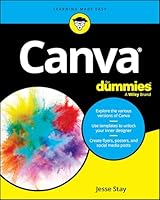
Coding with AngularJS For Dummies: Introduction to Developing Web Applications with AngularJS
- Length: 128 pages
- Edition: 1
- Language: English
- Publication Date: 2020-09-13
- ISBN-10: B08HZC1CGW
Coding with AngularJS For Dummies
Well, you’re in good hands!But we have a long road, you and me, with lots of things to learn :).We’re living exciting times in Web development. There is a new Angular. A complete rewrite of the good old AngularJS. Why a complete rewrite? Was AngularJS 1.x not enough?I like the old AngularJS very much. In our small company, we have built several projects with it,contributed code to the core framework, trained hundreds of developers (yes, really), and even written a book about it (in French, but that still counts).AngularJS is incredibly productive once you have mastered it. Despite all of this, it doesn’t preventus from seeing its weaknesses. AngularJS is not perfect, with some very difficult concepts to grasp,and traps hard to avoid.Most of all, the Web has changed since AngularJS was conceived. JavaScript has changed.
New frameworks have emerged, with great ideas, or better implementation. We are not the kind of developers to tell you that you should use this tool instead of that one. We just happen to know some tools very well, and know what fits the project. AngularJS was one of those tools, allowing usto build well-tested web applications, and to build them fast. We also tried to bend it where it didn’tfit. Don’t blame us, it happens to the best of us.Will Angular be the tool we will use without hesitation in our future projects? It’s hard to say right now, because the framework is really young and the ecosystem only just blooming.But Angular has a lot of interesting points, and a vision that few other frameworks have. It has been designed for the Web of tomorrow, with ECMAScript 6, Web Components and Mobile in mind.When it was first announced, I was, like many, sad at first that the 2.0 version would not be a simple update (I’m sorry if you’re just learning about it).
But I was also eager to see what solution the talented Google team would come up with.So I started to write this ebook, pretty much after the first commits, reading the design docs,watching the conference videos, reviewing every commit since the beginning. When I wrote my first ebook, about AngularJS 1.x, it was already a stable and known beast. This one is very different,it started when Angular was not even clear in the minds of its designers. Because I knew I wouldlearn a lot, not only about Angular but also about the concepts that would shape the future of Web development, some of which have nothing to do with Angular. And I did. I had to dig a lot about some of these concepts, and I hope that you will enjoy the journey of learning about them, and how they relate to Angular, as much as I did.
The ambition of this ebook is to evolve with Angular. If it turns out that Angular is the great framework we hope, you will receive updates with the best practices and some new features as they emerge (and with fewer typos, because, despite our countless reviews, there are probably some left…). And I would love to hear back from you – if some chapters aren’t clear enough, if you spot a mistake or if you have a better way for some parts.I’m fairly confident about the code samples, though, as they are all in a real project, with several hundred unit tests. It was the only way to write an ebook with a newborn framework, and to beable to catch all the problems that inevitably arose with each release.Even if you are not convinced by Angular in the end, I’m pretty sure you will have learnt a thing or two along your read.







